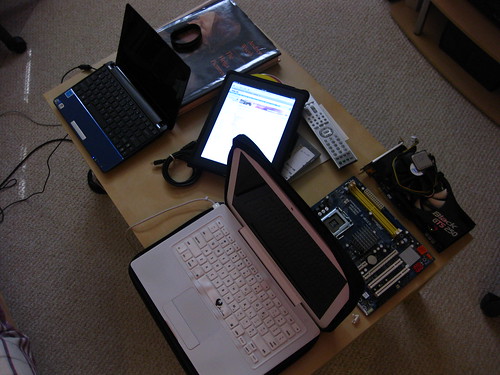One to one laptop programs have been around here in Australia for quite a while now. Gary Stager spoke extensively about that last year when he was in Australia, pointing out the work of David Loader who pioneered the first school notebook program at Melbourne's Methodist Ladies College back in 1990. I've visited a couple of schools who have ventured down that track - St Albans Meadows in Melbourne and Holy Family here in Adelaide - and the model seems to be the same whenever one talks about 1:1 in today's schools. Firstly, head over to the Anytime Anywhere Learning Foundation (AALF) website, plan your school's path forward using their excellent 21 Steps To 21st Century Learning and decide on a suitable affordable model of laptop to roll out.
I really enjoyed the sessions with Travis Smith late last year and took his advice of "don't rush your school community into things" advice to my site as we grapple with our own proposals for a 1 to 1 program. We are close to running a 1:1 classroom trial for the year in a key classroom to answer a number of the questions posed by our parent community. But what if the tried and true model of 1:1 laptops has already had its day?
Quite a few high schools around Adelaide have already jumped into the breech, rolling out parent funded laptops to their Year Eights. Through my contacts, I've seen some of the laptop choices (ranging from a 10 inch netbook to a Apple Macbook) and heard some of the stories. Paraphrased quotes and stories following below:
"My son was proud when his class received their laptops in the first week and he knew how to log on and get using it straightaway while some of his classmates struggled. Unfortunately, it hasn't been called upon in classes since."
"My sister had her laptop in her backpack when she went down to the beach after school with her friends and it got stolen."
So, the popular move is to use a one size fits all model. Working for a large system, I understand the thinking behind this - control, control and more control. It's seen in the way we set up wireless and networks in schools where digital certificates and complex logons manage and restrict the connected environment. This way, the school owns the laptops, can manage the software licensing, keep technical issues down to a minimum (which is lucky because most schools operate on a shoestring budget when it comes to technicians) and keep track of laptop movement via library barcodes. We can feed our filtered "safe" internet through these networks onto identical, predictable machines that equalise the connected experience.
But is this the only scenario?
I lurk on a mailing-list called Oz-teachers where the regular contributors debate topics in such an in-depth and authorative way that I feel more comfortable dipping into their conversations via my Gmail. Brett Clarke is an Oz-teachers frequenter whose observations really challenge my fairly conservative (conservative as in limited in scope, not as in right wing political leanings) world view. On a number of occasions, he has posited that 1 to 1 as a managed roll out is a concept that passed its start by date. Recently, he stated the following:
If you're at a school that didn't already catch that wave several years ago, then just skip it and move on. The kids will thank you for it and the staff won't have to learn the whole laptop thing and then learn what it means to go mobile 12 months later...
Another gem that has me wondering about what we should be doing in the primary when investing for the future:
I'll say it again - now is NOT the time to be starting a laptop/netbook programme in your school!
This is not to say schools shouldn't have some laptops - but not high ratios - just for the few situations where the tablet may not be the most convenient/appropriate alternative...
I'm also intrigued by David Truss's BYO Laptop program as a concept. I know from conversations with my students that a sizeable number of them already have a laptop of their own. I then wonder what their parents' reaction would be when the school announces a laptop program that dictates a particular model and cost. I can hear it already.
"Why can't my child just bring their laptop to school?"
There would need to be several major shifts in thinking to be able to say yes.
Firstly, our wireless network would have to change its security settings so that non-networked laptops could gain access. There would be the issue of software licensing and a well thought approach so that office software like OpenOffice or possibly GoogleDocs become ways to avoid breaching proprietary software licenses. The biggest shift would have to come from teachers who are comfortable with familiar programs, network paths and occasional use of computing technology.
There are times when I think that the students are more ready for these shifts than we are.

